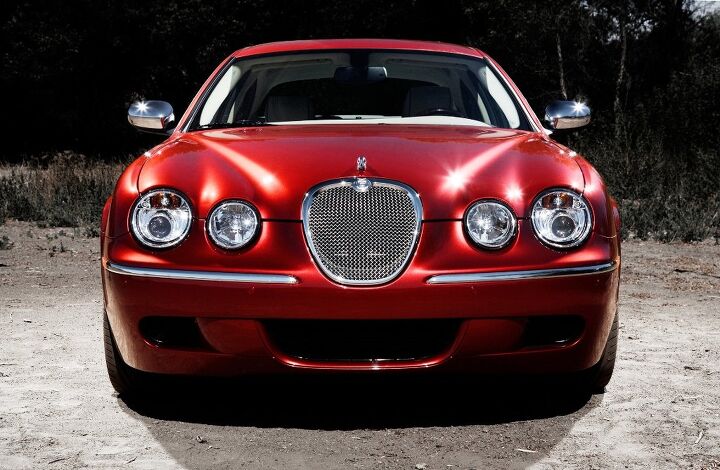Piston Slap: The Cat's Meow for OEM or Aftermarket Parts?

John writes:
I recently had a local shop confirm the need for O2 sensors in my Jaguar S-Type. With 97,000 miles on them, it seems very likely they need replacement, and the mechanic wants to install factory sensors at the cost of some $650 for the parts. I can purchase Denso or Bosch from the local parts store for less than $200. As these parts were originally designed to last at least 80,000 miles (Federal warranty requirement), I figure that replacements from any reputable source will last quite a long time.
What is your opinion as to brand specific parts versus more generic replacement parts?
I suspect the original supplier was actually Bosch anyway so in my mind they are the same.
Sajeev answers:
Your last sentence is my usual go-to statement, especially as cars depreciate to the age of any Jaguar S-Type. I still remember cringing when my trusted mechanic, some 15+ years ago, said my father’s Mark VIII’s (not the one I currently own) intermittent fuel smell was from leaky injectors. The replacement injectors cost $800, and they were a unique part number with no aftermarket alternative.
Perhaps that’s what he thought since it was the first Ford with that particular engine, but it was all bullshit: all Fords with that engine use the same 24 lb-hr injectors. I grabbed my Ford Motorsport catalog and ordered a set for $275-ish, delivered to the shop, and crossed my fingers for a seamless install. Thank goodness I was right.
Back to the “value” of factory vs. aftermarket parts on a heavily depreciated motor: it really depends. Factory body parts? Yes. In this case? No, get Bosch O2 sensors and pocket the extra cash.
Forget about the price, odds are they are the original equipment manufacturer (OEM) anyway. Sometimes you’ll even get a factory part when buying the “aftermarket” brand: happened to me when purchasing TRW control arms and several HVAC parts. And it’s nice to see those factory castings, part numbers or packaging when you’d never pay for them. It’s kinda like poppin’ tags, sort of.
When do you buy OEM bits, Best and Brightest?
[Image: Jaguar]
Send your queries to sajeev@thetruthaboutcars.com. Spare no details and ask for a speedy resolution if you’re in a hurry…but be realistic, and use your make/model specific forums instead of TTAC for more timely advice.

More by Sajeev Mehta
Latest Car Reviews
Read moreLatest Product Reviews
Read moreRecent Comments
- Bd2 Lexus is just a higher trim package Toyota. ^^
- Tassos ONLY consider CIvics or Corollas, in their segment. NO DAMNED Hyundais, Kias, Nissans or esp Mitsus. Not even a Pretend-BMW Mazda. They may look cute but they SUCK.I always recommend Corollas to friends of mine who are not auto enthusiasts, even tho I never owed one, and owned a Civic Hatch 5 speed 1992 for 25 years. MANY follow my advice and are VERY happy. ALmost all are women.friends who believe they are auto enthusiasts would not listen to me anyway, and would never buy a Toyota. They are damned fools, on both counts.
- Tassos since Oct 2016 I drive a 2007 E320 Bluetec and since April 2017 also a 2008 E320 Bluetec.Now I am in my summer palace deep in the Eurozone until end October and drive the 2008.Changing the considerable oils (10 quarts synthetic) twice cost me 80 and 70 euros. Same changes in the US on the 2007 cost me $219 at the dealers and $120 at Firestone.Changing the air filter cost 30 Euros, with labor, and there are two such filters (engine and cabin), and changing the fuel filter only 50 euros, while in the US they asked for... $400. You can safely bet I declined and told them what to do with their gold-plated filter. And when I changed it in Europe, I looked at the old one and it was clean as a whistle.A set of Continentals tires, installed etc, 300 EurosI can't remember anything else for the 2008. For the 2007, a brand new set of manual rec'd tires at Discount Tire with free rotations for life used up the $500 allowance the dealer gave me when I bought it (tires only had 5000 miles left on them then)So, as you can see, I spent less than even if I owned a Lexus instead, and probably less than all these poor devils here that brag about their alleged low cost Datsun-Mitsus and Hyundai-Kias.And that's THETRUTHABOUTCARS. My Cars,
- NJRide These are the Q1 Luxury division salesAudi 44,226Acura 30,373BMW 84,475Genesis 14,777Mercedes 66,000Lexus 78,471Infiniti 13,904Volvo 30,000*Tesla (maybe not luxury but relevant): 125,000?Lincoln 24,894Cadillac 35,451So Cadillac is now stuck as a second-tier player with names like Volvo. Even German 3rd wheel Audi is outselling them. Where to gain sales?Surprisingly a decline of Tesla could boost Cadillac EVs. Tesla sort of is now in the old Buick-Mercury upper middle of the market. If lets say the market stays the same, but another 15-20% leave Tesla I could see some going for a Caddy EV or hybrid, but is the division ready to meet them?In terms of the mainstream luxury brands, Lexus is probably a better benchmark than BMW. Lexus is basically doing a modern interpretation of what Cadillac/upscale Olds/Buick used to completely dominate. But Lexus' only downfall is the lack of emotion, something Cadillac at least used to be good at. The Escalade still has far more styling and brand ID than most of Lexus. So match Lexus' quality but out-do them on comfort and styling. Yes a lot of Lexus buyers may be Toyota or import loyal but there are a lot who are former GM buyers who would "come home" for a better product.In fact, that by and large is the Big 3's problem. In the 80s and 90s they would try to win back "import intenders" and this at least slowed the market share erosion. I feel like around 2000 they gave this up and resorted to a ton of gimmicks before the bankruptcies. So they have dropped from 66% to 37% of the market in a quarter century. Sure they have scaled down their presence and for the last 14 years preserved profit. But in the largest, most prosperous market in the world they are not leading. I mean who would think the Koreans could take almost 10% of the market? But they did because they built and structured products people wanted. (I also think the excess reliance on overseas assembly by the Big 3 hurts them vs more import brands building in US). But the domestics should really be at 60% of their home market and the fact that they are not speaks volumes. Cadillac should not be losing 2-1 to Lexus and BMW.
- Tassos Not my favorite Eldorados. Too much cowbell (fins), the gauges look poor for such an expensive car, the interior has too many shiny bits but does not scream "flagship luxury", and the white on red leather or whatever is rather loud for this car, while it might work in a Corvette. But do not despair, a couple more years and the exterior designs (at least) will sober up, the cowbells will be more discreet and the long, low and wide 60s designs are not far away. If only the interiors would be fit for the price point, and especially a few acres of real wood that also looked real.


































Comments
Join the conversation
Plus, it's Bosch. It's not some no-name outfit you've never heard of (which, itself, probably wouldn't be the end of the world). Buy them.
My Mazda 5 had quite a few suspension issues early on. I replaced all the Mazda stuff that had issues with non OEM stuff. No problems in the 25k since most of the work done, on PA's awful roads with mostly city driving. I've found that every so often, the OEM stuff is the best bet. The rear wiper on the Mazda 5 is a Mazda only part, all the aftermarket blades don't work well, leaving a large area uncleared. It's worth the $20 every two years for the properly functioning part.